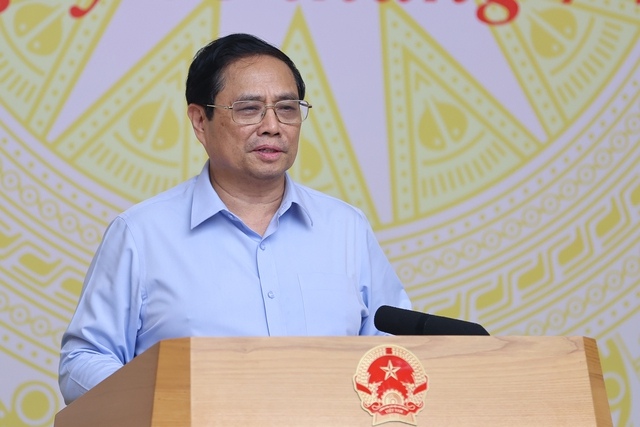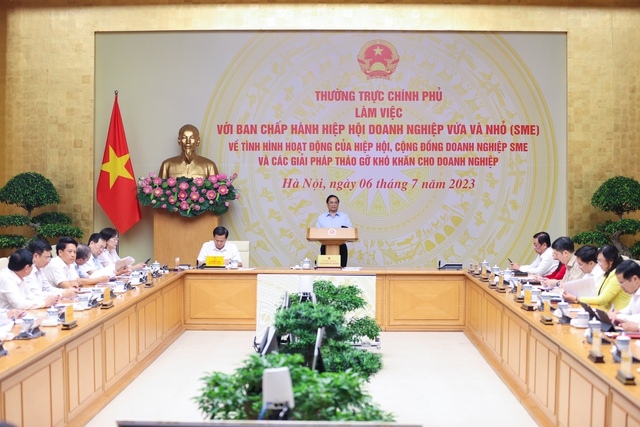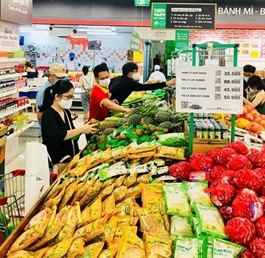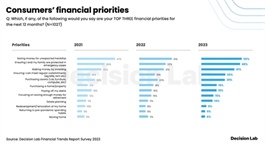PM urges banks to ease lending requirements for SMEs
PM urges banks to ease lending requirements for SMEs
The Government plans to develop mechanisms that enable small and medium-sized enterprises to venture into new fields such as innovation, digital transformation, and the promotion of green, circular, and sharing economy models.
Banks are urged to thoroughly review and ease credit requirements and reduce interest rates to provide timely support to businesses, especially small and medium enterprises (SMEs).

Prime Minister Pham Minh Chinh. Photos: Nhat Bac |
Prime Minister Pham Minh Chinh made the call at a meeting with the Vietnam Association of Small and Medium Enterprises (VinaSME) on July 6.
At the meeting, Vu Van Than, chairman of VinaSME, said SMEs had experienced a decline in revenues and job opportunities due to the impact of the Covid-19 pandemic and the global situation.
"The unfavorable economic environment has resulted in fewer orders, difficulties in production, and high costs of raw materials and fuel," Than said.
He suggested that the Government and relevant ministries create a favorable environment for businesses to access credit, further reduce interest rates, and consider establishing funds that use credit leverage to finance their operations.
SMEs currently account for 97% of all businesses in the country. A recent survey of 10,000 businesses found that 59% cited order-related issues as their biggest difficulty, 51% faced challenges in accessing capital, and the rest encountered obstacles in administrative procedures.
Prime Minister Pham Minh Chinh stressed that the State Bank of Vietnam (SBV) should pursue a more accommodative monetary policy in addition to the measures already implemented by the government and ministries, such as tax cuts, debt deferral, and fee adjustments.
"This includes increasing money supply and credit availability, reducing interest rates, and easing credit conditions to support production and business activities," he said.
The Prime Minister also stressed the need for businesses and banks to foster better communication, share responsibilities, and address challenges together.

Overview of the meeting. |
"Banks should try to understand the perspective of businesses and vice versa," Chinh said, urging localities to work with banks and businesses to solve problems in specific sectors and projects.
According to the State Bank of Vietnam, credit growth at the end of June was a modest 3.6%, only about one-third of this year's 14-15% target. After four rounds of adjustments in the State Bank's policy rates, commercial banks reduced deposit rates by an average of 0.7%, while lending rates fell by 1% year-on-year.
In terms of preferential credit packages, the Prime Minister recommended that the banking sector focus on promoting a credit package worth VND120 trillion (US$5.06 billion) for social housing projects, along with an additional VND10 trillion (US$422.5 million) for enterprises in the timber and forest products industry.
The Government plans to assess available funds and explore supportive solutions for human resource training, with a priority on developing mechanisms to enable small and medium-sized enterprises to venture into new areas such as innovation, digital transformation, and the promotion of green, circular, and sharing economy models, Chinh said.
The Prime Minister has tasked the SBV with studying and implementing credit packages to stimulate consumer demand. The Ministry of Planning and Investment will review regulations for allocating infrastructure investment projects to SMEs.
To address the lack of orders, the Ministry of Industry and Trade has been tasked with intensifying trade promotion efforts; promoting the effectiveness of existing free trade agreements (FTAs); initiating negotiations for new FTAs; diversifying markets, products, and supply chains; and improving the quality of basic products.






















